Shawn Otto, one of the organizers of Science Debate 2008, just send around some depressing E-mail - there's a move to remove money for the National Science Foundation and other science/energy-related appropriations from the stimulus package.
These are areas that can use more money, so to hear that some additional funding is being deleted is frustrating.
I sent the following E-mail to my senators, as well as a somewhat edited version to Senator Nelson and Collins:
I was shocked that Ben Nelson and Susan Collins are calling for gutting funding completely for NSF and for the DOE office of science and reducing funding for other science and energy-related areas from the Senate American Reinvestment and Recovery Act. We've suffered through eight years of scientific illiterates running the federal government. We need to keep funding up for the National Science Foundation, which leads in getting more research money to colleges and universities. We need to do more research into renewable and clean energy. Must our research infrastructure be in as bad shape as our roads, bridges and public schools?
Not-so-Occasional Comments on Life, Death and Many Things in Between by Laurie Mann
Friday, February 06, 2009
Tuesday, February 03, 2009
Economics Isn't Physics - What Politicians Don't Get About Recovering from a Severe Recession
While I am not an economist, it's clear that we're in a severe recession. We're in this recession for many reasons.
Unfortunately, we're dealing with "fundamentalist economists" - people who will always tell you that there is only one way to do something, regardless of empirical evidence. Conservative economists will insist the trickle-down effect of lowering taxes on the rich is the way to go. This may have worked in the early '80s and early '00s, but it clearly hasn't worked in a few years [2012 update - Actually, I'm wrong about this - there's evidence that "trickle down" did not work in the '80s either]. If anything, this may have sent the economy more into the tank. Liberal economists will insist that massive spending programs are the only way to bolster the economy. That might have worked some in the late '30s and the late '60s, but it doesn't work for very long and can lead to additional years of recession.
Different times call for different solutions.
Much as I abhor federal deficits, we need massive but targeted federal spending and that taxes must be raised on people making more than $100,000 a year. This is not the time for trickle-down - this is the time for building up. Our infrastructure is in horrible shape after years of governmental neglect. How many more bridge collapses are we going to have to have before people wake up and see how badly we need another big roads bill? Our government should also be employing more modern methods, such as green energy plans, online medical records and modernizing public education.
Economic isn't physics. Physics describes laws that are consistent. Economics is a much softer science than its practitioners would care to admit. If I drop a ball from the Empire State Building and one from a 737, it's going to always fall at the same rate of speed. Gravity is a constant. But economies do not fall or rise at a constant rate. Psychology plays heavily into economics. After years of irrational exuberance, we seem to in a state of near-irrational economic despair.
Americans deserve some of that despair. Both the investing market and the housing market went completely bonkers over the last few years, because there was almost no oversight. Common sense by governments, institutions and individuals went completely out the window.
My husband and I have been doing pretty well over the last few years. While I have been unable to remain reliably employed, my husband has a good job and we've always been careful about spending. We have savings and a diversified portfolio of investments.
We bought our first house in 1987 and our second in 1993. We put 5% down on the first house and 20% down on the second. We had good a good credit rating. Of course we sweated getting our first mortgage a little, but we knew we'd get it.
We sold our first house during a housing downturn in 1994 and lost money. We had a lasting lesson that housing prices don't just go up. And, this was in Massachusetts, a place where the housing market, after 1994, went from being expensive to being extremely expensive.
In 2006, we decided to buy a new house. As my husband manages his group from home and I was unemployed, we could have moved anywhere. After looking at housing prices in several areas, we decided to stay in Pittsburgh, where we have family and friends and could buy much more home for the money. For the same money that bought a largish, new house in rural Western Pennsylvania would have bought a 50 year old ranch in eastern Massachusetts or a one car garage in the Bay area of California. We wanted the space and the quiet, so we stayed here. We're very glad we did!
We put 20% down on our new home. Our mortgage broker tried to talk us out of putting that much down. We were stunned by this attitude, but put 20% down anyway, and later paid most of the money from the sale of our old house (which took nearly six months to sell) against the principal of the new. We also worked to keep the costs of our mortgage as low as possible. Selling stock to buy a house in early 2006 turned out to be a very good move, and staying in the Pittsburgh area was a real win. While the housing prices peaked around then, our house has lost much less value than our stocks have. Since the Pittsburgh housing market had a huge bust back in 1980-1981, it's lost very little value during this housing bust.
While I understand that mortgage brokers and banks were trying hard to get people to buy houses a few years back, their "you don't need to put money down" attitude was incredibly short-sighted. Many people don't understand the importance of paying principal on houses and other investments. While laws should encourage home ownership, they also need to encourage people to put money down, to actually own a percentage of the property.
We could have probably gotten a million dollar mortgage in California or New York, but we would have had barely invested 5% in a house in one of those markets. Living that far beyond our means was completely unacceptable to us. Unfortunately, it wasn't unacceptable to many Americans who did just that over the last 10 years or so.
And that goes for government spending too. The federal government has been mortgaging our children's and grandchildren's future without making the rich pay more taxes. Over the last few years, the number of yachts and luxury mansions owned by Americans skyrocketed. Why do you think that happened? Because the super-rich were the biggest beneficiaries of the Bush tax cuts. Wealthy Americans who can afford to pay more taxes should be paying more taxes. Much as I respect President Obama, his refusal to kill the Bush tax cuts for the rich and give the rich yet more tax breaks was a horrible way to start off his administration.
So what we need is a rational tax/stimulus package includes:
We need to look at new, logical ways to manage the economy, without being rigidly bound to the theories of the past. And by "economy," I don't mean merely at the government/industry level - I mean the economy of individual families too. In the case of families, returning to the old theories of living within their means, saving for the future and avoiding using credit cards may help prevent another mega-recession in the forseeable future.
Many individuals are in the midst of personal financial failure. They've lost their houses and their jobs. In some cases, it really wasn't their fault. People who did their best to live within their means and made reasonable choices deserve society's compassion and support. They deserve the chance to refinance and not be foreclosed upon, if there's any hope they might be able to manage the payments.
But let's take a look at some outstanding cases where individuals need to take some responsibility for their incredibly illogical choices:
We need a country that was once generally based in common-sense behavior and personal accountability from the individual, through businesses and up to the very highest reaches of the government. I hope that will happen again, but, unfortunately, we have a very long way to go.
- Economic Cycles. No matter what we do, the economy will always have some down times. A wise government would have had adequate controls in place so that the economy wouldn't crash and burn very much. However, we haven't had a wise, forward-thinking government in years
- Unfettered Greed. We've been in a period of economic irrational exuberance that encouraged massive greed
- Lack of Oversight. Companies and individuals have engaged in massive fraud and just plain stupid behavior on a scale we haven't seen since the '20s since there was very little governmental oversight (the Republicans were also in control of the federal government for eight years before the Great Depression, another time of little governmental oversight over companies)
Unfortunately, we're dealing with "fundamentalist economists" - people who will always tell you that there is only one way to do something, regardless of empirical evidence. Conservative economists will insist the trickle-down effect of lowering taxes on the rich is the way to go. This may have worked in the early '80s and early '00s, but it clearly hasn't worked in a few years [2012 update - Actually, I'm wrong about this - there's evidence that "trickle down" did not work in the '80s either]. If anything, this may have sent the economy more into the tank. Liberal economists will insist that massive spending programs are the only way to bolster the economy. That might have worked some in the late '30s and the late '60s, but it doesn't work for very long and can lead to additional years of recession.
Different times call for different solutions.
Much as I abhor federal deficits, we need massive but targeted federal spending and that taxes must be raised on people making more than $100,000 a year. This is not the time for trickle-down - this is the time for building up. Our infrastructure is in horrible shape after years of governmental neglect. How many more bridge collapses are we going to have to have before people wake up and see how badly we need another big roads bill? Our government should also be employing more modern methods, such as green energy plans, online medical records and modernizing public education.
Economic isn't physics. Physics describes laws that are consistent. Economics is a much softer science than its practitioners would care to admit. If I drop a ball from the Empire State Building and one from a 737, it's going to always fall at the same rate of speed. Gravity is a constant. But economies do not fall or rise at a constant rate. Psychology plays heavily into economics. After years of irrational exuberance, we seem to in a state of near-irrational economic despair.
Americans deserve some of that despair. Both the investing market and the housing market went completely bonkers over the last few years, because there was almost no oversight. Common sense by governments, institutions and individuals went completely out the window.
My husband and I have been doing pretty well over the last few years. While I have been unable to remain reliably employed, my husband has a good job and we've always been careful about spending. We have savings and a diversified portfolio of investments.
We bought our first house in 1987 and our second in 1993. We put 5% down on the first house and 20% down on the second. We had good a good credit rating. Of course we sweated getting our first mortgage a little, but we knew we'd get it.
We sold our first house during a housing downturn in 1994 and lost money. We had a lasting lesson that housing prices don't just go up. And, this was in Massachusetts, a place where the housing market, after 1994, went from being expensive to being extremely expensive.
In 2006, we decided to buy a new house. As my husband manages his group from home and I was unemployed, we could have moved anywhere. After looking at housing prices in several areas, we decided to stay in Pittsburgh, where we have family and friends and could buy much more home for the money. For the same money that bought a largish, new house in rural Western Pennsylvania would have bought a 50 year old ranch in eastern Massachusetts or a one car garage in the Bay area of California. We wanted the space and the quiet, so we stayed here. We're very glad we did!
We put 20% down on our new home. Our mortgage broker tried to talk us out of putting that much down. We were stunned by this attitude, but put 20% down anyway, and later paid most of the money from the sale of our old house (which took nearly six months to sell) against the principal of the new. We also worked to keep the costs of our mortgage as low as possible. Selling stock to buy a house in early 2006 turned out to be a very good move, and staying in the Pittsburgh area was a real win. While the housing prices peaked around then, our house has lost much less value than our stocks have. Since the Pittsburgh housing market had a huge bust back in 1980-1981, it's lost very little value during this housing bust.
While I understand that mortgage brokers and banks were trying hard to get people to buy houses a few years back, their "you don't need to put money down" attitude was incredibly short-sighted. Many people don't understand the importance of paying principal on houses and other investments. While laws should encourage home ownership, they also need to encourage people to put money down, to actually own a percentage of the property.
We could have probably gotten a million dollar mortgage in California or New York, but we would have had barely invested 5% in a house in one of those markets. Living that far beyond our means was completely unacceptable to us. Unfortunately, it wasn't unacceptable to many Americans who did just that over the last 10 years or so.
And that goes for government spending too. The federal government has been mortgaging our children's and grandchildren's future without making the rich pay more taxes. Over the last few years, the number of yachts and luxury mansions owned by Americans skyrocketed. Why do you think that happened? Because the super-rich were the biggest beneficiaries of the Bush tax cuts. Wealthy Americans who can afford to pay more taxes should be paying more taxes. Much as I respect President Obama, his refusal to kill the Bush tax cuts for the rich and give the rich yet more tax breaks was a horrible way to start off his administration.
So what we need is a rational tax/stimulus package includes:
- having genuine governmental oversight (laws with teeth) over industries and over any stimulus money that goes to companies
- spending to improve our infrastructure (and education is infrastructure)
- training everyone, from children through adults, on responsible decision-making about money
- gradually reducing the number of troops abroad
- a small tax cuts for households making less than $60,000 a year
- a small tax increase for households making $100,000-$200,000 a year
- a larger tax increase on income over $200,000 a year (and maybe even an additional tax bracket for people who make over $200,000 a year)
We need to look at new, logical ways to manage the economy, without being rigidly bound to the theories of the past. And by "economy," I don't mean merely at the government/industry level - I mean the economy of individual families too. In the case of families, returning to the old theories of living within their means, saving for the future and avoiding using credit cards may help prevent another mega-recession in the forseeable future.
Many individuals are in the midst of personal financial failure. They've lost their houses and their jobs. In some cases, it really wasn't their fault. People who did their best to live within their means and made reasonable choices deserve society's compassion and support. They deserve the chance to refinance and not be foreclosed upon, if there's any hope they might be able to manage the payments.
But let's take a look at some outstanding cases where individuals need to take some responsibility for their incredibly illogical choices:
- Anyone who put all their financial eggs in one basket, from the folks at Enron to the folks who turned over all their money to people like Bernie Madoff. Diversification has been the primary rule of investing for generations. That's one thing that hasn't changed.
- People who support others no matter how ludicrously they behave. Sorry, the woman in California who went bankrupt helping her daughter have 14 children is as certifiable as her daughter is. (I have a bad feeling some cable channel will launch a reality show around these folks, but the proliferation of "reality" shows that do nothing but promote irresponsibility is a wholly separate rant.) People need to make rational choices. Parents need to tell their children "NO" sometimes.
We need a country that was once generally based in common-sense behavior and personal accountability from the individual, through businesses and up to the very highest reaches of the government. I hope that will happen again, but, unfortunately, we have a very long way to go.
Labels:
bankruptcy,
common sense,
depression,
economy,
personal responsibility
Monday, January 26, 2009
Sing-a-long in the Hay-Adams Bar: My Trip to the 2009 Inauguration
Why I Went to Washington
In the 1960s, I grew up in a lily-white, mostly middle class small town in New England. About the only black people I ever saw where ones on TV, being hit by water from fire hoses and being attacked by dogs on the evening news. Those scenes made me dislike white southerners in power, and made me feel something was really unfair about the way some people in our country were being treated. I remember hearing Dr. Martin Luther King speak on TV. When he said, "I hope that one day my four little children will be judged not by the color of their skin but by the content of their character," I understood why he said what he did. I was six years old, and that made complete sense to me. It was possible to understand a little bit about racism without having experienced it personally. When I was nine, I went to summer camp. Robin slept in the bunk over me. I wrote to my parents, "A Negro girl named Robin is in my cabin. No one is making fun of her." At camp we learned that we could all live in the same cabin without any problem. At about the same time, riots broke out and cities burned. I didn't understand poverty and hopelessness could drive people to such lengths. I have to say, It didn't make any more sense to me than the white policemen setting fire hoses on teenagers, or some nut bombing a church. Most of America has made great strides in race relations since the '60s. It's not perfect. but it is getting better. To paraphrase Rev. Theodore Parker and Dr. Martin Luther King, "The arc of a civilized society is a long one, but it bends towards justice." The election of Barack Obama was one of the most civilized things our society has done. As an American and an Obama supporter, I wanted to be in Washington to help celebrate his Inauguration. I drove to DC from Pittsburgh on Sunday morning. It was snowy over half the way down, so it took nearly six hours to get there (usually, it takes about four and a half). I got to my brother and sister-in-law's house in Silver Spring. I dropped off my stuff, and my brother took me to the Metro. I went to town to watch the Inaugural Concert at the Lincoln Memorial. I walked towards the Lincoln Memorial, but the line into the concert wasn't moving much. I walked up the hill to the Washington Monument. There was a crowd on the Lincoln Memorial side of the Washington Monument, but there was still plenty of space.
I walked towards the Lincoln Memorial, but the line into the concert wasn't moving much. I walked up the hill to the Washington Monument. There was a crowd on the Lincoln Memorial side of the Washington Monument, but there was still plenty of space.
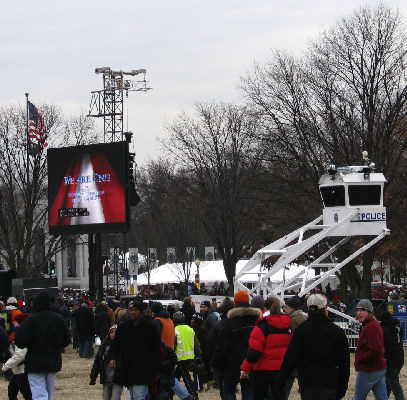 Some of the Jumbotrons were set up on the Lincoln Memorial side of the Washington Monument, along with an odd police vehicle that looked like a viewing booth atop a huge scissor-lift.
Some of the Jumbotrons were set up on the Lincoln Memorial side of the Washington Monument, along with an odd police vehicle that looked like a viewing booth atop a huge scissor-lift.
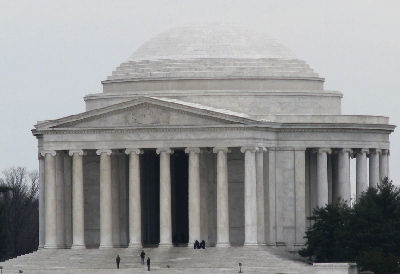 The Jefferson Memorial was pretty dead during the weekend.
More About My Inaugural Trip
The Jefferson Memorial was pretty dead during the weekend.
More About My Inaugural Trip
Saturday, December 20, 2008
Milk: The Best Movie of 2008
It's possible I might see a better movie in the next two weeks, but I doubt it.
When history is known (like, say, with the upcoming WWII movie Valkyrie about a plot to assassinate Hitler), a movie can loose its dramatic tension since "we know what happens." A good director, screenwriter and cast can compensate by dynamic direction, an intelligent script and spot-on acting. Milk succeeds on all points. Director Gus Van Sant and screenwriter Dustin Lance Black have created a compelling movie. And Sean Penn gives the most joyful, winning performance I've ever seen from him.
Milk is the story of an unlikely political activist. Harvey Milk was a closeted gay guy in New York City until his very late 30s. The early scenes of Milk remind you what a bad old time the '50s and '60s were for gay men, with old footage of police raids on gay bars.
By the early '70s, Harvey had met Scott, a much younger man. They ran off to San Francisco together where they opened a camera store. They had a very affectionate relationship. If this movie had been about a heterosexual couple and not a homosexual couple, it would have been rated PG-13 instead of R. Still, I've heard reports of some audience members leaving during the early kissing scenes (there are some sex scenes, but they are extremely discreet). Why would you go to a movie about a gay man coming out of the closet if watching two men kissing was going to upset you? I didn't leave when the hate-mongers in the movie spewed homophobia; this is truly disgusting compared to two men (or two women) kissing.
As a business owner, Harvey understood the importance of being out and being organized. He became a frequently unsuccessful candidate for local office, while becoming more politically able and building a network of young men to support neighborhood causes. In these scenes, some of the actors are actually old friends of Harvey's from the '70s. In at least five different scenes, you see the writer Frank Robinson, a man who was Harvey's contemporary. While I wish they'd mentioned who Frank was, it was nice to see he was involved in the movie.
Harvey became an expert at working the crowd and working the press. While Scott had served as Harvey's campaign manager, he was disillusioned by politics and the pair split up. Harvey went on to win the 1977 election for city supervisor. Harvey became involved with a volatile Hispanic man named Jack, and became close friends with Cleve Jones.
Even though Harvey had a local victory, he got very involved fighting California's Proposition 6, a measure to fire gay teachers and their supporters. It was promoted by Anita Bryant (who only appears in this movie in old clips - a nice touch to reinforce how passe she should be) and John Briggs, a California state senator. After months of pushing, Harvey got to debate John several times. In the run-up to the statewide vote on Prop 6, Jack committed suicide which left Harvey fairly depressed. However, after pollsters and early results made it look like Prop 6 would pass, it wound up failing by a large margin.
While he was fighting against Prop 6, Harvey tried to cultivate positive relationships with the other city supervisors. The relationship between he and newly-elected conservative supervisor Dan White was fairly contentious. After months of not getting any legislation passed, Dan resigned from the city supervisors and tried to get his job back. When he didn't get it, he smuggled himself in the city office building, and assassinated both Mayor Moscone and Harvey Milk.
The movie certainly captured the grief of San Francisco following these assassinations. But these impact of these murders went way beyond San Francisco. I was 21, married, and living in Pittsburgh when I heard about them. To this day, I can't watch that famous tape of Diane Feinstein informing the public of the murders without weeping. And I had the same reaction today, at the beginning and ending of Milk. But most of Milk is one of the most vivid recreations of the '70s I've ever seen, with a performance that should win Sean Penn his second Oscar (and, maybe an supporting actor Oscar nomination for James Franco's fine performance as Scott). Emile Hirsch was good as Cleve Jones, who later went on to be an AIDS activist and create the Names Project (the AIDS Quilt).
This movie must be seen by the people least likely to see it - the people who think things like Proposition 8 are a good idea. Consenting adults deserve to live their lives as they choose, without fear of retribution.
When history is known (like, say, with the upcoming WWII movie Valkyrie about a plot to assassinate Hitler), a movie can loose its dramatic tension since "we know what happens." A good director, screenwriter and cast can compensate by dynamic direction, an intelligent script and spot-on acting. Milk succeeds on all points. Director Gus Van Sant and screenwriter Dustin Lance Black have created a compelling movie. And Sean Penn gives the most joyful, winning performance I've ever seen from him.
Milk is the story of an unlikely political activist. Harvey Milk was a closeted gay guy in New York City until his very late 30s. The early scenes of Milk remind you what a bad old time the '50s and '60s were for gay men, with old footage of police raids on gay bars.
By the early '70s, Harvey had met Scott, a much younger man. They ran off to San Francisco together where they opened a camera store. They had a very affectionate relationship. If this movie had been about a heterosexual couple and not a homosexual couple, it would have been rated PG-13 instead of R. Still, I've heard reports of some audience members leaving during the early kissing scenes (there are some sex scenes, but they are extremely discreet). Why would you go to a movie about a gay man coming out of the closet if watching two men kissing was going to upset you? I didn't leave when the hate-mongers in the movie spewed homophobia; this is truly disgusting compared to two men (or two women) kissing.
As a business owner, Harvey understood the importance of being out and being organized. He became a frequently unsuccessful candidate for local office, while becoming more politically able and building a network of young men to support neighborhood causes. In these scenes, some of the actors are actually old friends of Harvey's from the '70s. In at least five different scenes, you see the writer Frank Robinson, a man who was Harvey's contemporary. While I wish they'd mentioned who Frank was, it was nice to see he was involved in the movie.
Harvey became an expert at working the crowd and working the press. While Scott had served as Harvey's campaign manager, he was disillusioned by politics and the pair split up. Harvey went on to win the 1977 election for city supervisor. Harvey became involved with a volatile Hispanic man named Jack, and became close friends with Cleve Jones.
Even though Harvey had a local victory, he got very involved fighting California's Proposition 6, a measure to fire gay teachers and their supporters. It was promoted by Anita Bryant (who only appears in this movie in old clips - a nice touch to reinforce how passe she should be) and John Briggs, a California state senator. After months of pushing, Harvey got to debate John several times. In the run-up to the statewide vote on Prop 6, Jack committed suicide which left Harvey fairly depressed. However, after pollsters and early results made it look like Prop 6 would pass, it wound up failing by a large margin.
While he was fighting against Prop 6, Harvey tried to cultivate positive relationships with the other city supervisors. The relationship between he and newly-elected conservative supervisor Dan White was fairly contentious. After months of not getting any legislation passed, Dan resigned from the city supervisors and tried to get his job back. When he didn't get it, he smuggled himself in the city office building, and assassinated both Mayor Moscone and Harvey Milk.
The movie certainly captured the grief of San Francisco following these assassinations. But these impact of these murders went way beyond San Francisco. I was 21, married, and living in Pittsburgh when I heard about them. To this day, I can't watch that famous tape of Diane Feinstein informing the public of the murders without weeping. And I had the same reaction today, at the beginning and ending of Milk. But most of Milk is one of the most vivid recreations of the '70s I've ever seen, with a performance that should win Sean Penn his second Oscar (and, maybe an supporting actor Oscar nomination for James Franco's fine performance as Scott). Emile Hirsch was good as Cleve Jones, who later went on to be an AIDS activist and create the Names Project (the AIDS Quilt).
This movie must be seen by the people least likely to see it - the people who think things like Proposition 8 are a good idea. Consenting adults deserve to live their lives as they choose, without fear of retribution.
Labels:
Harvey Milk,
homosexual rights,
movies,
Oscars
Thursday, November 13, 2008
My Vision for American Change
The Obama change.gov site has invited Americans to submit their vision for changing the country. Here's what I sent them:
The Obama campaign tapped into the power of distributing information and encouraging volunteerism by its great Web outreach. The Obama administration could do much more of the same.
There are people all over this country who would love to work for the Obama administration. We aren't interested in big jobs or living in Washington. We interesting in helping to coordinate federal resources and local needs. The Web can be a powerful tool in decentralizing and accomplishing more on the local level.
For many years, the Federal government has been portrayed as being completely out of touch with the varied types of communities across this country. To some degree, this has been true, in Republican as well as Democratic administrations. As President-elect Obama well knows, being a community organizer should be a high calling in this society.
The Obama campaign tapped into the power of distributing information and encouraging volunteerism by its great Web outreach. The Obama administration could do much more of the same.
There are people all over this country who would love to work for the Obama administration. We aren't interested in big jobs or living in Washington. We interesting in helping to coordinate federal resources and local needs. The Web can be a powerful tool in decentralizing and accomplishing more on the local level.
For many years, the Federal government has been portrayed as being completely out of touch with the varied types of communities across this country. To some degree, this has been true, in Republican as well as Democratic administrations. As President-elect Obama well knows, being a community organizer should be a high calling in this society.
Wednesday, November 05, 2008
Democracy Is a Great Thing!
After two federal elections with some questionable results, Americans showed yesterday that the more people who vote, the harder it is for the people engaged in vote suppression and vote fraud to get away with it. Yes, there were some problems, but the overwhelming number of voters and the people who worked the polls to defend the principle of "one person one vote" more than compensated for those problems.
Good luck, president-elect Obama and vice president-elect Biden!!!!!!!
Good luck, president-elect Obama and vice president-elect Biden!!!!!!!
Tuesday, November 04, 2008
Congratulations, President-Elect Obama!
I'm very happy he's won.
I give Senator McCain credit - he gave a very fine concession speech.
I give Senator McCain credit - he gave a very fine concession speech.
Monday, November 03, 2008
Not Dead Yet - American Democracy
Keep it alive - if you are registered, vote tomorrow!
Don't stand for people engage in vote fraud, vote suppression or anything else that tries to screw with our democracy. The more people who vote, the harder it is to game the system.
If you see any problems, contact:
Election Protection -- 866-687-8683
Black Box Voting -- 206-335-7747
AND
Your County's Election Board; you might take the time to look up this number before you go vote.
(If you put "voter fraud" into Google today, the JohnMcCain.com Web site comes up as a paid ad, put if you put "report vote fraud" into Google, you get an Obama paid ad! *sigh*)
And may the best candidates win!
Don't stand for people engage in vote fraud, vote suppression or anything else that tries to screw with our democracy. The more people who vote, the harder it is to game the system.
If you see any problems, contact:
Election Protection -- 866-687-8683
Black Box Voting -- 206-335-7747
AND
Your County's Election Board; you might take the time to look up this number before you go vote.
(If you put "voter fraud" into Google today, the JohnMcCain.com Web site comes up as a paid ad, put if you put "report vote fraud" into Google, you get an Obama paid ad! *sigh*)
And may the best candidates win!
Tuesday, October 28, 2008
Report from Barack Obama's Pittsburgh Rally
I had the opportunity to volunteer for the Barack Obama rally in Pittsburgh on Monday. A local organizer connected me to Sally Matts, so we could commute together to Pittsburgh.
We took the 28X into town and got up to the Mellon Arena a little after 1. A long line had already formed:
Beginning:
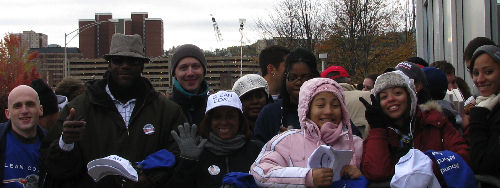
Towards the end:
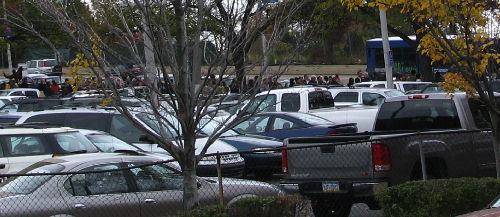
In the middle:
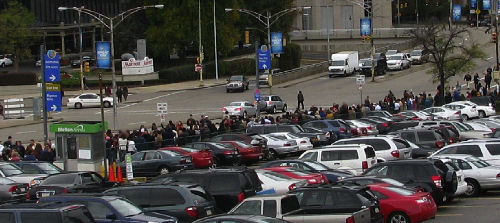
The line extended for several blocks (up past St. Benedict the Moor church for the folks familiar with the area).
We waited around while the staff got the volunteers organized. That took a while. They wanted most of us to encourage the attendees to sign up to help Get Out the Vote over the weekend...but ran out of clipboards before Sally and I got them.
I've worked all kinds of events, and one thing that was really clear from this one is that there was inadequate signage. I walked around a little, and suggested to Sally that we invent a job for ourselves. We decided to escort handicapped attendees up to the handicapped entrance, which was on the far side of the Mellon Arena from the main street entrance. We talked to a staffer who agreed that was a good idea.
So we stood about midway up the hill to the Arena, where the entrance road and the parking lot meet. When we saw someone who seemed to be having trouble, we brought them up to the handicapped entrance.
This was tricky (of course). The sidewalk was blocked off in places, so we'd direct people in wheelchairs to the adjacent road. There were surprisingly few cuts through the curb for wheelchairs. The one closest to the handicapped entrance had a car parked in front if it illegally. Luckily, there was still enough space around the car that people in mobies could get back up onto the sidewalk.
And then, someone who was either with the fire department or the TSA (not sure which) parked in front of the illegally parked car in such a way that we could no longer get handicapped attendees up the ramp and back onto the sidewalk. I went to him and said, "Um, excuse me, sir? Could you push ahead a little so we could get people back on the sidewalk?"
He growled at me a little, and went off in search of the person who was parking illegally. Luckily, he found the person pretty fast, the person drove away, and the cops stuck a sawhorse in front of the ramp so no one could park in the way.
Sally got cold and went inside. I begged her to save me a seat and she did.
I managed to stay outside until about 4:30, when I got too cold and had to go in. The speeches were due to start at 5, but I figured Obama would be running late. I found another volunteer and got him to help bring handicapped attendees up to the special entrance.
I hit the bathroom, bought some "dinner" (hot dog and popcorn) and found Sally. She'd saved great seats not too far from the podium and off the floor in the staff area. The Arena seats 17,000 for hockey games. While there was a floor over the ice, there floor wasn't completely filled up by people (the press area was spacious and not filled). Not every fixed seat in the arena was filled either. I'd estimate there were between 14,000 and 15,000 in the arena, a good crowd given it was a weekday, the weather was cold, and we'd only heard about this on Friday.
The TV camera area was towards our right:
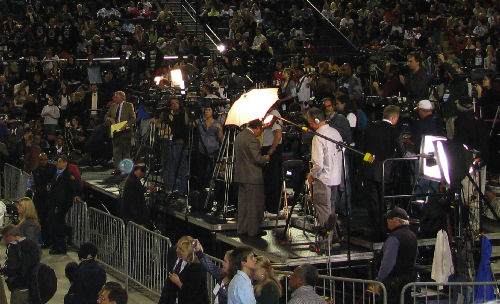
The floor and the podium were towards our left, just to the left of all those supporters who were standing:

The rally was due to start at 5. The weird thing was that the rally started at about 4:45. Rallies almost never start early. Governor Ed Rendell, Senator Bob Casey and local Congressional Representative Mike Doyle gave short speeches. Then there was nearly a half hour of recorded music (and I don't think the writers/performers have asked Obama not to use it, unlike some other campaigns I could mention).
Just before 5:30, Steeler president Dan Rooney came out to introduce Barack Obama. When Obama came onstage, the cheers were deafening. Rooney handed him a Steelers' jersey:
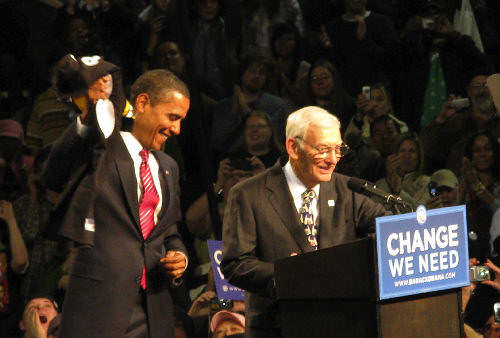
Sally Matts foreground, Barack Obama background

I've heard Obama speak on TV a number of times. While he's often a little stiff, he speaks very intelligently, unlike your average politician. He sounds like he's thinking about what he's saying and not just repeating sound bites or blurting out something wildly inappropriate. It was definitely worthwhile to hear him speak in person. Yeah, there were bits and pieces of his standard stump speech and his Democratic National Convention speech, but he seems to adapt it slightly for his audience.
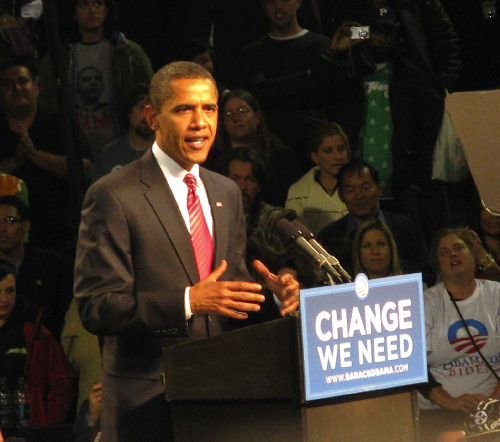
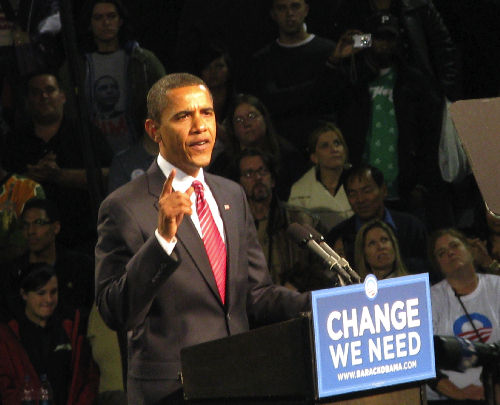
Obama's speech, which lasted about a half hour, hit all the right notes. People were still coming in, half-way through his speech. The audience was enthusiastic. There were only one or two hecklers. Everyone was welcome to this rally (no tickets, no vetting by local Democrats). The fact there were so few Republican intrusions was indicative of the fact that McCain/Palin don't have as much support in Pittsburgh as they'd like to pretend (when they were in Western Pennsylvania last week, McCain drew about 4,400 people and Palin about 2,000). The Democratic vote in and near the main cities usually exceeds the Republican vote in the rural parts of the state, and I hope this will be true this year.
It was a great rally!
My favorite sign:
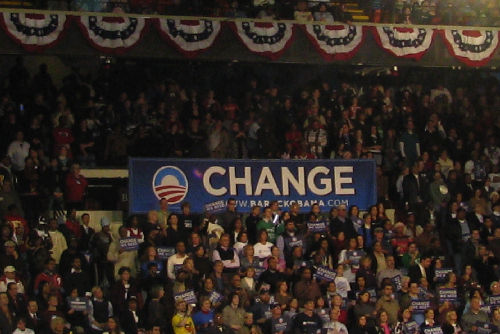
After his speech, Obama went down on the floor to shake hands. Sally and I decided we'd just as soon find the bus and get home, which we did.
I took a test this morning which I saw in adelheid-p's Live Journal.
There's only one more thing to say: VOTE!!!!!!
We took the 28X into town and got up to the Mellon Arena a little after 1. A long line had already formed:
Beginning:

Towards the end:

In the middle:

The line extended for several blocks (up past St. Benedict the Moor church for the folks familiar with the area).
We waited around while the staff got the volunteers organized. That took a while. They wanted most of us to encourage the attendees to sign up to help Get Out the Vote over the weekend...but ran out of clipboards before Sally and I got them.
I've worked all kinds of events, and one thing that was really clear from this one is that there was inadequate signage. I walked around a little, and suggested to Sally that we invent a job for ourselves. We decided to escort handicapped attendees up to the handicapped entrance, which was on the far side of the Mellon Arena from the main street entrance. We talked to a staffer who agreed that was a good idea.
So we stood about midway up the hill to the Arena, where the entrance road and the parking lot meet. When we saw someone who seemed to be having trouble, we brought them up to the handicapped entrance.
This was tricky (of course). The sidewalk was blocked off in places, so we'd direct people in wheelchairs to the adjacent road. There were surprisingly few cuts through the curb for wheelchairs. The one closest to the handicapped entrance had a car parked in front if it illegally. Luckily, there was still enough space around the car that people in mobies could get back up onto the sidewalk.
And then, someone who was either with the fire department or the TSA (not sure which) parked in front of the illegally parked car in such a way that we could no longer get handicapped attendees up the ramp and back onto the sidewalk. I went to him and said, "Um, excuse me, sir? Could you push ahead a little so we could get people back on the sidewalk?"
He growled at me a little, and went off in search of the person who was parking illegally. Luckily, he found the person pretty fast, the person drove away, and the cops stuck a sawhorse in front of the ramp so no one could park in the way.
Sally got cold and went inside. I begged her to save me a seat and she did.
I managed to stay outside until about 4:30, when I got too cold and had to go in. The speeches were due to start at 5, but I figured Obama would be running late. I found another volunteer and got him to help bring handicapped attendees up to the special entrance.
I hit the bathroom, bought some "dinner" (hot dog and popcorn) and found Sally. She'd saved great seats not too far from the podium and off the floor in the staff area. The Arena seats 17,000 for hockey games. While there was a floor over the ice, there floor wasn't completely filled up by people (the press area was spacious and not filled). Not every fixed seat in the arena was filled either. I'd estimate there were between 14,000 and 15,000 in the arena, a good crowd given it was a weekday, the weather was cold, and we'd only heard about this on Friday.
The TV camera area was towards our right:

The floor and the podium were towards our left, just to the left of all those supporters who were standing:

The rally was due to start at 5. The weird thing was that the rally started at about 4:45. Rallies almost never start early. Governor Ed Rendell, Senator Bob Casey and local Congressional Representative Mike Doyle gave short speeches. Then there was nearly a half hour of recorded music (and I don't think the writers/performers have asked Obama not to use it, unlike some other campaigns I could mention).
Just before 5:30, Steeler president Dan Rooney came out to introduce Barack Obama. When Obama came onstage, the cheers were deafening. Rooney handed him a Steelers' jersey:

Sally Matts foreground, Barack Obama background

I've heard Obama speak on TV a number of times. While he's often a little stiff, he speaks very intelligently, unlike your average politician. He sounds like he's thinking about what he's saying and not just repeating sound bites or blurting out something wildly inappropriate. It was definitely worthwhile to hear him speak in person. Yeah, there were bits and pieces of his standard stump speech and his Democratic National Convention speech, but he seems to adapt it slightly for his audience.


Obama's speech, which lasted about a half hour, hit all the right notes. People were still coming in, half-way through his speech. The audience was enthusiastic. There were only one or two hecklers. Everyone was welcome to this rally (no tickets, no vetting by local Democrats). The fact there were so few Republican intrusions was indicative of the fact that McCain/Palin don't have as much support in Pittsburgh as they'd like to pretend (when they were in Western Pennsylvania last week, McCain drew about 4,400 people and Palin about 2,000). The Democratic vote in and near the main cities usually exceeds the Republican vote in the rural parts of the state, and I hope this will be true this year.
It was a great rally!
My favorite sign:

After his speech, Obama went down on the floor to shake hands. Sally and I decided we'd just as soon find the bus and get home, which we did.
I took a test this morning which I saw in adelheid-p's Live Journal.
You Should Be Allowed to Vote |
 You got 15/15 questions correct. Generally speaking, you're very well informed. If you vote this election, you'll know exactly who (and what) you'll be voting for. You're likely to have strong opinions, and you have the facts to back them up. |
There's only one more thing to say: VOTE!!!!!!
Labels:
obama,
pittsburgh,
vote
Monday, October 27, 2008
Meme: So What Were You Writing About the Federal Election in 2004?
Every once in a while, I get a sense of "deja vu all over again" about the presidential election. So, I went back and read my November, 2004 blog entries (if you want to read them, remember, jump to the bottom of the file and work your way up).
Hmm, I was overconfident (briefly), but not so much that I didn't work on the campaign or vote.
The post-election analysis was interesting. Fewer people voted than Democrats counted on and the youth voting rate was no higher in 2004 than it had been in 2000. I sincerely hope both of those things will turn out differently this time.
So, here's an informal meme for you - if you wrote about the 2004 election online, link to it from your blog or LiveJournal or however you write on the Internet. What were you thinking then? What do you think now? What do you think will be different this time?
Hmm, I was overconfident (briefly), but not so much that I didn't work on the campaign or vote.
The post-election analysis was interesting. Fewer people voted than Democrats counted on and the youth voting rate was no higher in 2004 than it had been in 2000. I sincerely hope both of those things will turn out differently this time.
So, here's an informal meme for you - if you wrote about the 2004 election online, link to it from your blog or LiveJournal or however you write on the Internet. What were you thinking then? What do you think now? What do you think will be different this time?
Sunday, October 26, 2008
A "Pro-Jobs" Tax Ad - with Grover Norquist???
I saw one of those political ads (sponsored by "Americans for Tax Reform") that spoke darkly about "changing the tax structure will lose jobs."
The man narrating the ad was Grover Norquist.
That name was a blast from the past, where Norquist should stay. Norquist was the guy behind all those tax cuts Bush pushed back in 2001. In short, Norquist is the architect of the unprecedented deficit our government currently has.
Norquist is also the person who famously said:
My goal is to cut government in half in twenty-five years, to get it down to the size where we can drown it in the bathtub.
So if you want to live in a third world country, by all means, support the current tax structure, or candidates who would blindly leap into more tax cuts.
It's amazing that this group can be a 501(c)3. While this group wasn't specifically mentioning any particular party or candidate, it's clear they think we're still overtaxed and are encouraging voters to vote against the tax rate increases a responsible government needs to institute. If we had a strong national infrastructure and no deficit, I might agree that Americans are overtaxed. But we have a crumbling infrastructure, inferior schools, extraordinarily uneven medical care and a massive deficit.
I don't think people making over $100,000 a year are being overtaxed. There's every evidence that they're not, thanks to nearly eight years of irresponsible Republican "leadership."
The man narrating the ad was Grover Norquist.
That name was a blast from the past, where Norquist should stay. Norquist was the guy behind all those tax cuts Bush pushed back in 2001. In short, Norquist is the architect of the unprecedented deficit our government currently has.
Norquist is also the person who famously said:
My goal is to cut government in half in twenty-five years, to get it down to the size where we can drown it in the bathtub.
So if you want to live in a third world country, by all means, support the current tax structure, or candidates who would blindly leap into more tax cuts.
It's amazing that this group can be a 501(c)3. While this group wasn't specifically mentioning any particular party or candidate, it's clear they think we're still overtaxed and are encouraging voters to vote against the tax rate increases a responsible government needs to institute. If we had a strong national infrastructure and no deficit, I might agree that Americans are overtaxed. But we have a crumbling infrastructure, inferior schools, extraordinarily uneven medical care and a massive deficit.
I don't think people making over $100,000 a year are being overtaxed. There's every evidence that they're not, thanks to nearly eight years of irresponsible Republican "leadership."
Wednesday, October 08, 2008
Single Issue Folks Are At It Again...
With the economy tanking, the government bailing out Wall St and many other problems, some things never change. The anti-abortion fanatics are at it again, showing large, graphic posters on Route 60 in Robinson today and calling Obama a "baby killer."
Maybe those of us who against war should print up large graphic posters of the war dead, and talk about "killer" McCain?
While I believe strongly in the right of women to chose abortion or birth control, I'm not a single-issue voter so I do not use this a litmus test. I voted for Casey, despite the fact he does not agree with my views on abortion.
This country cannot afford another Republican administration. For people to claim that they are "pro-life," it's unbelievable that they can't be bothered to understand that the Republicans have been anything but.
Maybe those of us who against war should print up large graphic posters of the war dead, and talk about "killer" McCain?
While I believe strongly in the right of women to chose abortion or birth control, I'm not a single-issue voter so I do not use this a litmus test. I voted for Casey, despite the fact he does not agree with my views on abortion.
This country cannot afford another Republican administration. For people to claim that they are "pro-life," it's unbelievable that they can't be bothered to understand that the Republicans have been anything but.
Monday, October 06, 2008
McCain Graduated 894th...in a class of 899...from Annapolis!
That's such an amazing statistic, I'm surprised no one has raised it before.
W. is reported to have graduated in the bottom 20th percentile from Yale.
Barack Obama graduated from Columbia and got his law degree from Harvard magna cum laude.
Let's have a smart president for a change!
W. is reported to have graduated in the bottom 20th percentile from Yale.
Barack Obama graduated from Columbia and got his law degree from Harvard magna cum laude.
Let's have a smart president for a change!
Friday, October 03, 2008
Carl Sagan Predicted the Current State of America - in 1995
I was always a big fan of Carl Sagan's. The science blog The Intersection has reminded us that Carl Sagan predicted the current anti-science attitude of so many in America. If anyone in power had bothered to pay attention, we might not quite be in this state now:
Carl Sagan and Ann Druyan The Demon-Haunted World
Science is more than a body of knowledge; it is a way of thinking. I have a foreboding of an America in my children's or grandchildren's time — when the United States is a service and information economy; when nearly all the key manufacturing industries have slipped away to other countries; when awesome technological powers are in the hands of a very few, and no one representing the public interest can even grasp the issues; when the people have lost the ability to set their own agendas or knowledgeably question those in authority; when, clutching our crystals and nervously consulting our horoscopes, our critical faculties in decline, unable to distinguish between what feels good and what's true, we slide, almost without noticing, back into superstition and darkness.
Carl Sagan and Ann Druyan The Demon-Haunted World
Thursday, September 25, 2008
Another Problem with the Republican-Proposed Bailout - Who Pays???
"Notice how the taxation ring on the right is dark and quiet, even though the government needs the better part of an extra terabuck? I guess the theory is that reckless borrowing got us into this mess and reckless borrowing can get us out."
Blogger Mike Benveniste
Yeah, that's yet another problem with the Bush bailout, if not the biggest problem with it.
Blogger Mike Benveniste
Yeah, that's yet another problem with the Bush bailout, if not the biggest problem with it.
Tuesday, September 23, 2008
Palin Supporters and Ongoing Theme of Constant Outrage Over NOTHING
I saw this headline at CNN today:
"Palin incest spoof on SNL draws fire"
but it was attached to a video and I didn't want to watch it. I finally found a printed article, to see if Palin supporters were really that stupid.
Yes, it turns out that some of them are. Perpetually outraged, because actually thinking about the ramifications of a satire is a bit beyond many of them.
I watched Saturday Night Live over the weekend, and saw the skit in question. It skewered journalists, not the Palins. The skit made the Palins look like victims of the media, and it made journalists look unbelievably stupid and vapid. The right wing should have been applauding it.
But no...
On the other hand, journalists have generally been bright enough to understand it was a satire, and haven't been so offended.
"Palin incest spoof on SNL draws fire"
but it was attached to a video and I didn't want to watch it. I finally found a printed article, to see if Palin supporters were really that stupid.
Yes, it turns out that some of them are. Perpetually outraged, because actually thinking about the ramifications of a satire is a bit beyond many of them.
I watched Saturday Night Live over the weekend, and saw the skit in question. It skewered journalists, not the Palins. The skit made the Palins look like victims of the media, and it made journalists look unbelievably stupid and vapid. The right wing should have been applauding it.
But no...
On the other hand, journalists have generally been bright enough to understand it was a satire, and haven't been so offended.
"Privatizing Gains, Socializing Losses..." Describing the US Financial Mess in Four Words
New York Times columnist Gretchen Morgenson was on NPR's "Fresh Air" today, and she succinctly summed up the problem with the bail-out Bush and buddies are pushing.
It's critical that the US not rush into fixing this problem. Our government needs to take a deep breath and ensure that as little federal money goes into this as possible and that safeguards are implemented rather than ignored.
It's critical that the US not rush into fixing this problem. Our government needs to take a deep breath and ensure that as little federal money goes into this as possible and that safeguards are implemented rather than ignored.
Monday, September 22, 2008
Tell Your Senator to Vote CAUTIOUSLY on Any Massive Financial Bailout
E-mail or call your senator today to ask for caution and oversight. Senator Dodd's plan is more in the right direction than the "no strings" plan the Republicans are pushing.
One person in government cannot control that kind of money. As we've seen over the last seven years by the Republicans, absolutely power corrupts absolutely. And money is power.
One person in government cannot control that kind of money. As we've seen over the last seven years by the Republicans, absolutely power corrupts absolutely. And money is power.
Saturday, September 20, 2008
What Obama Needs to do...
Offer more plans for dealing with the financial mess the Republicans got us into. There were way too many cozy deals being made for financial institutions during the Bush/Cheney administration. Frankly, many of us believe that the bailouts will cover golden parachutes for upper management and nothing for the middle class people with investments.
Hit the Republicans and Palin for ignoring supeonas. A person who claims to be a reformer cannot ignore supeonas. Politicians keep behaving like they're above the law - Obama should hit this attitude often.
I still have a great deal of respect for Obama, but he needs to be a bit more forceful. It almost seemed like he peaked with his wonderful acceptance speech at the Democratic National Convention and has been surprisingly quiet since then. America can't afford for him to be quiet.
Hit the Republicans and Palin for ignoring supeonas. A person who claims to be a reformer cannot ignore supeonas. Politicians keep behaving like they're above the law - Obama should hit this attitude often.
I still have a great deal of respect for Obama, but he needs to be a bit more forceful. It almost seemed like he peaked with his wonderful acceptance speech at the Democratic National Convention and has been surprisingly quiet since then. America can't afford for him to be quiet.
Wednesday, September 03, 2008
Issues Do Matter - The Science 2008 Debate
In the middle of the first set of Palin bruhahas, Obama's office released information some of us were waiting for:
Barack Obama's answers to the top 14 science questions facing America
Granted, the media and many Americans have demonstrated they aren't as interested in the issues as they ought to be. I keep waiting for James Carville to pipe up "It's the economy, stupid," or someone (anyone) to notice our massive, massive deficit.
The Science 2008 Debate has been an attempt to get the candidates focused on issues that should be important to more Americans. Thanks to the Obama campaign for taking the time to look at these important issues.
Barack Obama's answers to the top 14 science questions facing America
Granted, the media and many Americans have demonstrated they aren't as interested in the issues as they ought to be. I keep waiting for James Carville to pipe up "It's the economy, stupid," or someone (anyone) to notice our massive, massive deficit.
The Science 2008 Debate has been an attempt to get the candidates focused on issues that should be important to more Americans. Thanks to the Obama campaign for taking the time to look at these important issues.
Subscribe to:
Comments (Atom)